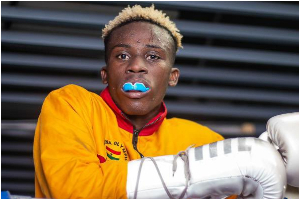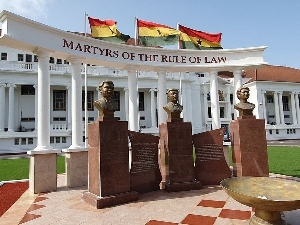- Home - News
- TWI News | TV
- Polls
- Year In Review
- News Archive
- Crime & Punishment
- Politics
- Regional
- Editorial
- Health
- Ghanaians Abroad
- Tabloid
- Africa
- Religion
- Election 2020
- Coronavirus
- News Videos | TV
- Photo Archives
- News Headlines
- Press Release
General News of Monday, 2 June 2008
Source: GNA
Centre to monitor election-related violence set up
Accra, June 2, GNA - The Institute of Economic Affairs (IEA) has been charged to set up a centre for monitoring election related violence as the nation warms up for the December general polls. The centre would document all reported incidents of inter and intra party election violence, proactive actions and alert the affected political parties and the relevant security agencies to those incidents to ensure that Election 2008 is fought on a clean campaign strategy, IEA statement stated in Accra.
The establishment of the centre forms part of a communiqu=E9 issued after a strategic workshop organised by IEA in collaboration with the National Commission for Civic Education (NCCE) and the National Peace Council (NPC) at Elmina during the weekend.
The workshop discussed strategies for ensuring that the 2008 General Elections are peaceful and devoid of violence. It was attended by representatives of the registered political parties in Ghana, the Electoral Commission, media practitioners and civil society organizations.
The workshop was on the theme: "Ensuring Peaceful and Violence-Free Elections in 2008."
The communiqu=E9 also called for a meeting of Inter Party Advisory Committee (IPAC) to discuss the Report of the Committee that investigated the alleged bloated voters' register in 13 constituencies in the Ashanti Region which was submitted to the EC on May 30 for possible and final decisions taken and published to put the matter to rest.
"The EC must strain every sinew to resolve the problems that have delayed the registration of qualified but unregistered voters in order to ensure that the time-table for the December 2008 elections is not adversely affected," the statement stated.
In particular, the EC must ensure that the final voters' registers are delivered to political parties at least three months before the elections.
It urged the Government to ensure that resources for the December 2008 elections were adequate and that they were released on time to the EC and other relevant agencies.
Political parties, religious leaders, the media and civil society generally must make strenuous efforts to educate the public about the risks of selling the country's democracy to the highest bidder if money is made the basis for voting for candidates and political parties. The communiqu=E9 said the media in general must be fair and unbiased in their reportage of political and electoral campaign activities in the run-up to the elections. The state-owned media in particular, must comply with the constitutional injunction to grant equal access to all political parties and presidential candidates. It said the IEA and other civil society organizations should lobby for provision to be made in the 2008 Supplementary Budget, if one is envisaged, for the funding of political parties for the 2008 elections as a short-term measure whilst advocacy for the passage of the draft Public Funding of Political Parties' Bill continued as a medium-term objective.
The communiqu=E9 urged Government to observe the convention that had developed in the Fourth Republic under which it allocated vehicles to political parties participating in the elections through the EC immediately after filing of nominations. Both the government and Ghana's development partners were also called upon to provide support for polling agents of all political parties and candidates.
The EC must also provide lanterns and solar lamps at polling stations and collation centres as part of standby arrangements in the event of non-availability of electricity as part of the overall security arrangements for the election The NCCE in collaboration with The IEA and other civil society organisations will organize special separate engagement sessions with the National House of Chiefs and the Association of Private Broadcasters, in particular, managers of the local language FM Stations, to make them appreciate their critical roles in ensuring a peaceful and violence-free election.
The communiqu=E9 said political parties undertook to educate their members and supporters to avoid the use of inflammatory and vile language that had the potency of triggering off violence. "The media must play the role of mediators between the electorate and political parties by policing and guiding the language of discussants, callers and those who send text messages. "Political party leaders will ensure that the spirit of friendship that characterizes the relations between them at the leadership level seeps down to their members and supporters through appropriate channels in order to make them appreciate that competitive politics can be conducted in an atmosphere devoid of acrimony." It urged the EC to consider alternatives to the current format of the ballot paper in order to avoid or reduce the large number of spoilt ballots.
"Political parties undertake to leave it to the EC to declare and announce the final election results at the national level, though it is acceptable for parties and the media to announce the results as and when they are declared by the EC officials at the polling stations and constituency levels."
It urged the EC, in selecting election officials, shall ensure that no known political activists were appointed and that the appointed officials were credible and conduct themselves professionally in order to ensure peaceful and violence-free elections. The communiqu=E9 said the NCCE must be adequately resourced to intensify civic education on tolerance and peace before, during and after the December Elections.










